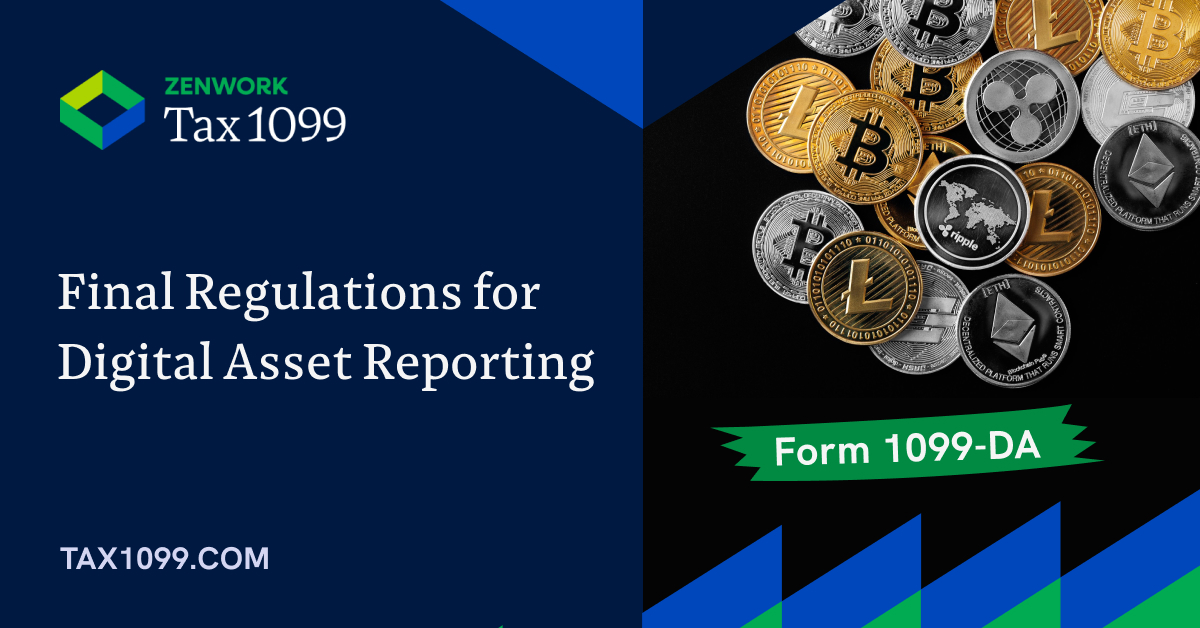On June 28, 2024, the Internal Revenue Service (IRS) released the highly anticipated final regulations covering the reporting of digital assets, including cryptocurrency, for income tax purposes. This reporting will be done on the yet-to-be-finalized Form 1099-DA, starting with transactions that occur on or after January 1, 2025. The IRS revealed the draft version of Form 1099-DA earlier this year.
The final regs apply to brokers who take possession of digital assets being sold by their customers. This includes operators of custodial digital asset trading platforms, certain digital asset-hosted wallet providers, digital asset kiosks, and certain processors of digital asset payments. Several open questions and interpretations are coming about what entities have a reporting obligation. So, check back here as we get updates!
In addition, the final regulations also provide transitional relief from reporting penalties and backup withholding. It also covers the transition from a gross-proceeds reporting approach to a wallet-by-wallet or account-by-account basis allocation approach.
Changes Made from the Proposed Regulations
The regulations were developed after the IRS held a public hearing. They reviewed over 44,000 comments in response to the proposed regulations. The final regulations contain some notable changes and clarifications from the proposed regulations.
- Gross proceeds from deals completed on or after January 1, 2025, must be reported by brokers.
- Brokers must report the basis for specific transactions made on or after January 1, 2026.
- Real estate professionals who are treated as brokers must report the fair market value of digital assets involved in real estate transactions with closing dates on or after Jan. 1, 2026.
- For certain sales of stablecoins and non-fungible tokens, brokers can choose to report the transactions on an aggregate basis to the extent the sales exceed respective de minimis thresholds (there are a bunch of these exceptions).
- For processors of digital asset payments (PDAP) sales, a different de minimis criterion is also in effect.
Additional Rules and Procedures
In addition to the broker reporting rules, the regulations include penalty relief for brokers:
- Notice 2024-56
- Notice 2024-57
Notice for Penalty Relief
Notice 2024-56 details penalty relief for brokers who fail to report digital assets sales or fail to furnish payee statements. For transactions in 2025 (reported in 2026), the IRS won’t penalize brokers for not filing or providing Forms 1099-DA if they make a good faith effort and genuinely attempt to submit the forms and associated payee statements accurately and on time.
Brokers are also released from backup withholding obligations and related penalties by the notice:
- For every transaction that takes place in the tax year 2025.
- For transactions executed in 2026 on behalf of a client from whom the broker obtains the TIN and name and sends it to the IRS for the TIN-matching program and gets confirmation that the name-TIN combination matches IRS records.
- For sales that are governed by PDAPs, and for the disposal of digital assets in exchange for specific NFTs or real estate, until additional guidance is released.
Notice on Temporary Exceptions Until Further Guidance is Issued
Notice 2024-57 details certain identified transactions for which brokers are not required to furnish payee statements or file Forms 1099-DA until further guidance is issued by the IRS:
- Wrapping/ unwrapping transactions
- Liquidity provider transactions
- Staking transactions
- Transactions described as lending of digital assets by digital asset market participants
- Transactions described as short sales of digital assets
- Notional principal contract transactions
These adjustments could cause challenges, but they provide more credibility and transparency. The IRS will have access to broad information relating to tax reporting, and so will customers.
Final Thoughts
Based on the timeline the IRS proposed, Form 1099-DA would be available for filing starting on January 1, 2026. This would require professionals entities who are classified as digital asset brokers to report the sales and exchanges of digital assets during the 2025 tax year.
Tax1099 is here to guide you for the upcoming digital asset reporting and its compliance. Contact our experts today and Subscribe to your Newsletter to receive all the latest updates on cryptocurrency tax and IRS regulatory changes.



